High School Students Experience Nuclear Engineering—and More—at the New Exploring NPRE Camp
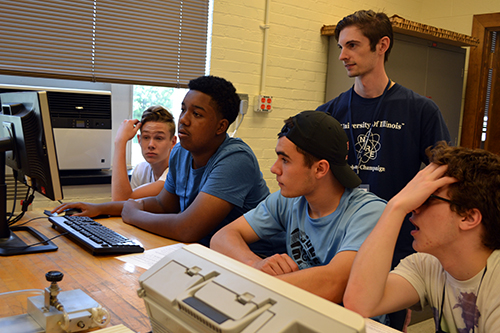
A group of NPRE campers work through an activity on a computer.
July 6, 2018
Exactly what is nuclear engineering? It has to do with power plants, right? On campus the week of June 25–29th for the first-ever Exploring NPRE camp, 18 high school students discovered that nuclear power is just one emphasis of NPRE (the Department of Nuclear, Plasma, and Radiological Engineering). Plus, the rising juniors and seniors, mostly from the Chicagoland area, who attended NPRE’s week-long, residential camp not only learned about nuclear engineering, but plasma and radiological engineering as well, and how they impact our lives. Plus, they learned a bit about Illinois, and what it might be like to be an engineering student on campus.
According to Becky Meline, Coordinator of Academic Programs for NPRE and also Coordinator of the new camp, high school students are commonly not exposed to nuclear engineering unless they're lucky enough to have a chemistry or a physics teacher who happens to touch on it. Thus, NPRE’s goal was to make students aware of what the department has available.
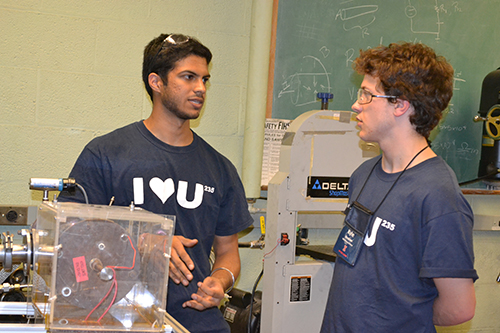
An NPRE camper (right) interacts with NPRE grad student Nirbhav Chopra about the DC Glow Chamber during a tour of the Plasma Lab.
“So we wanted to basically make them aware of what nuclear engineering is and all of the different applications, because even if they've heard of nuclear engineering, sometimes they think only about nuclear power generation or stereotypes about nuclear power. But there are also a lot of other applications that they may not be aware of.”
She goes on to cite a few: plasma fusion science and engineering, which is a whole area of NPRE; radiological applications, with its disparate uses ranging from medicine to national security; as well as materials-related research related to power plasma fusion. According to Meline, the activities planned for the camp cut across all the different areas of the department.
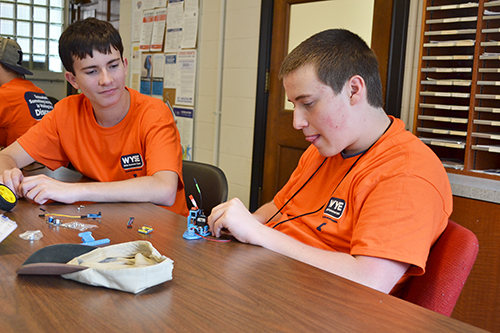
A camper works on his team's robot.
Throughout the week, NPRE faculty and their research groups led sessions comprised of lectures, demonstrations, tours, and hands-on activities related to NPRE’s diverse research areas. For instance, in one session, campers built light detectors, or sensors, using Arduinos. One afternoon they were in one of the labs learning about radiation, shielding, and half-life. Another activity addressed nuclear medicine, such as the use of radioactive tracers, as well as radiology (X-rays), where the students also learned about different imaging modalities, such as PET and CT. Campers learned about plasma, how it affects our lives, and some of its applications. For example, one activity explored the ways plasma and radiation can modify material surfaces. Plus, with their finger on the pulse of what young people are interested in nowadays, the camp gave the high schoolers the chance to design and build their own personalized game, using Unity, a well-known game designing software.
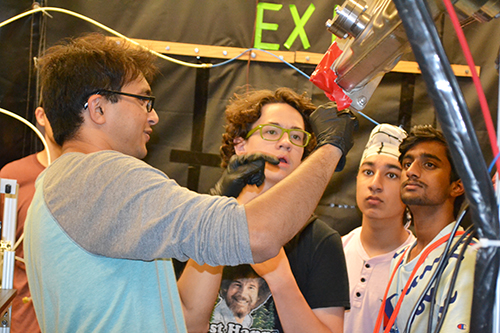
At the Plasma Lab, an NPRE student (left) gives the campers a close-up view of some of the materials they work with in the lab.
The camp also featured several tours. For instance, armed with Gamma-Ray detectors, the campers took a tour of campus to determine radiation levels of various locations. Participants also toured NCSA’s 3D animation resources, and the Materials Research Lab. Plus, on Thursday, campers visited the Exelon Clinton Power Station. “We have a good working relationship with them,” Meline explains, “so we're happy that the students are going to be able to meet with some of engineers from Exelon. It's the closest nuclear station to us.”
But it wasn’t just all work and no play. Following the visit to the Clinton Power Station, the campers stopped by to visit another nearby attraction, Clinton Lake, for some well-deserved R&R.
And to wrap up the weeks activities, on Saturday, when their parents came to pick them up, the students presented a PowerPoint with photos to give their parents a glimpse of all that they had learned and experienced throughout the week.
Meline says NPRE's goal in doing the camp was mostly outreach—making students aware—along with maybe a little recruiting. “It'd be great to have students say that they want to apply not just to the College of Engineering, but to NPRE directly. But even if they don't, they leave with a more educated understanding of what the area is about, and that's a good thing as well,” she adds.
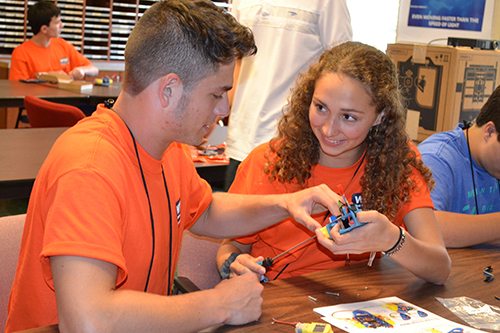
Two campers work together to build their robot.
The many NPRE graduate and undergraduate students who were involved with Explore NPRE no doubt had similar goals. For example, Zoe Richter, a senior in NPRE, hoped to do a bit of recruiting and get some of the students interested in nuclear engineering. When she explains why she got involved with the camp, she relates an anecdote about participating in the Women in Engineering Orientation as an incoming freshman. She recalls that there was one girl representing nuclear engineering and only two girls who were interested in the field among all the incoming freshmen. “So when I heard that our department was doing a bigger camp for people interested in nuclear engineering, I wanted to help out.”
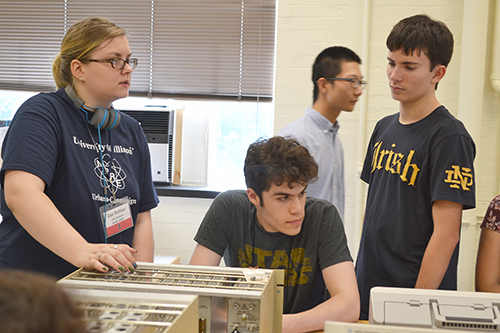
A rising NPRE senior Zoe Richter (left) works with campers during a Radiation Lab activity.
What impact does she believe the camp had? Richter says that while there was one participant in particular who was clearly interested in nuclear engineering, for many of the others, it exposed them to engineering at Illinois. She believes that for most, their motivation for participating was, “I want to be an engineer in general. I just want a taste of what it's like. I want to see the campus, because I'm trying to decide if I want to go here, and I'd like to meet some people and meet the campus.”
So while many hadn’t necessarily settled on an engineering discipline as of yet, she believes one positive impact of the camp was: “just helping them understand their options, understand what's available to them, try to figure out if Illinois is a good fit for them, and maybe more of them will go here, and they get to meet their new classmates, meet some new friends before they even come to campus. So I think that's really cool.”
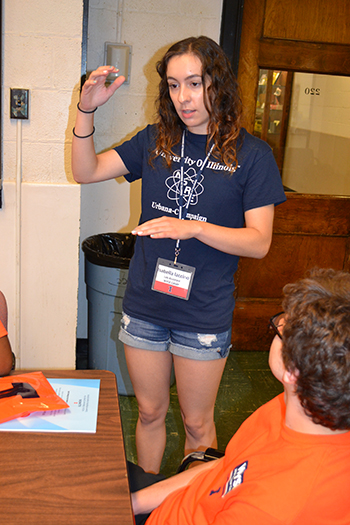
A rising junior in NPRE, Isabella Iaccino, explains an activity to the campers.
Also helping with the camp was Isabella Iaccino, a rising junior in NPRE in the plasma concentration. (For those of us who don’t know what plasma is, other than in relation to blood, Iaccino explains: “It’s an ionized gas. So the best example is the sun or lightning. It's when an electric current goes through some gas and pulls the electrons off of the atom. So I study how that happens, different kinds of plasmas we can make, and different things we can do with plasmas.”)
Iaccino, who really enjoys outreach, got involved with Explore NPRE because she wanted to help students discover what engineering is so they can make informed career decisions. She shares about her experience in high school.
“I had no idea what engineering was,” she admits. “I knew I liked math and science, but I thought that I had to choose between them. And then, luckily enough, my high school had opportunities for me to learn about engineering and take engineering classes, but if I didn't have that opportunity at my high school, I don't know if I would be where I am today.”
She adds that she really enjoys engineering and wants to help other students figure out that this is an option. “Whether or not they want to do it, they can decide for themselves, but I want to make sure that they know this is an option if this is what they enjoy.”
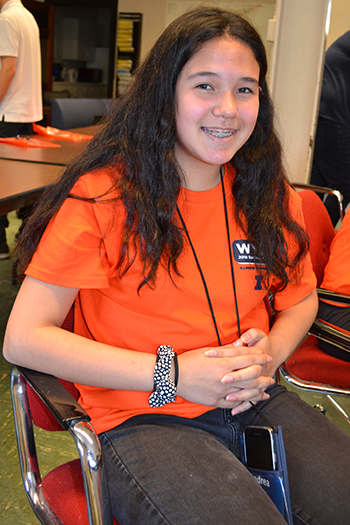
A rising sophomore who attended the NPRE camp, Andrea Grisalez.
For the campers themselves, the first word of the camp’s name, “Exploring,” says it all. For example, Andrea Grisalez, a rising sophomore at Jones College Prep in downtown Chicago, who indicates that she’s interested in engineering in general, says she attended Exploring NPRE because, “It's something I'm interested in, and it's a good experience.”
Regarding whether she might choose nuclear engineering or not, she says she’s “not sure quite yet which one,” but acknowledges that NPRE’s camp was “fun, and “more hands-on than I expected.”
Another camper, Brendan Walker, a rising junior at Cincinnati Country Day High School, took part in NPRE’s camp because he: “really wanted to get a feel for engineering and also a feel for a college campus, especially one with a College of Engineering.” Still exploring, he indicates, “I'm not really sure what I want to do yet, so I kind of want to verse myself in different subjects before I make my decision.”
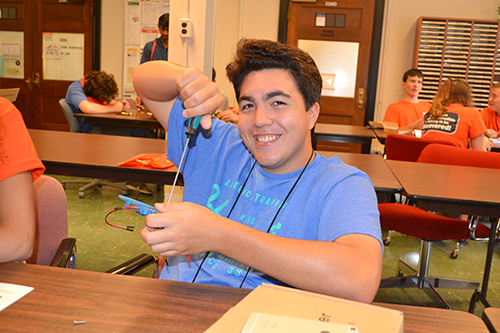
Brendan Walker works on his team's robot during an NPRE hands-on activity.
Walker definitely achieved his goal of getting a feel for the campus. He reports that in addition to having a good time at the camp, he was impressed with Illinois: “I'm really liking it. I'm really liking the atmosphere. I'm really liking—it kind of feels like I'm almost in college in a way. Going to classes and doing work. Everyone here is super friendly. We've made friends within the first few days. It’s just a wonderful environment to be in, and the counselors are really nice, really funny. I'm just enjoying it.”
Story and photographs by Elizabeth Innes, Communications Specialist, I-STEM Education Initiative.
More: 8-12 Outreach, Engineering, Summer Camp, WYSE, 2018
For additional I-STEM articles on WYSE camps, please see:
- MechSE's WYSE Camp Helps High School Students Explore Mechanical Engineering
- WYSE Camps Treat Guys and Gals to an Engineering Smorgasbord
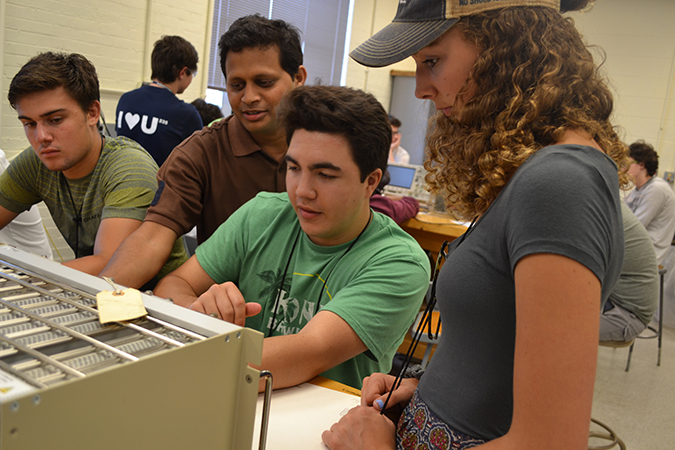
A group of NPRE campers work through an activity in NPRE's Radiation Lab.













.jpg)
















